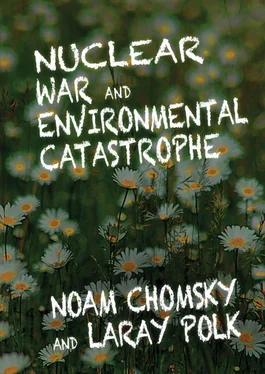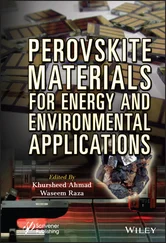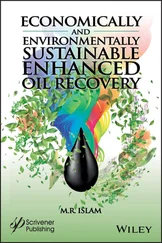In addition, there’s a great enthusiasm about tapping new sources of fossil fuels and doing it in ways which are extremely environmentally destructive: water and other resources are destroyed through fracking and deep-sea drilling.
[6] With approval from the Obama administration, Royal Dutch Shell began exploratory drilling in the Chukchi and Beaufort seas in summer 2012. However, the inability to respond to changing sea-ice conditions “underscores environmentalists’ concerns that Arctic Ocean conditions are too unpredictable for safe drilling and that industry isn’t up to the challenge.” Companies with similar plans include ExxonMobil (in partnership with Russia’s OAO Rosneft), ConocoPhillips, and Statoil ASA. Tom Fowler, “Shell Races the Ice in Alaska,” Wall Street Journal , August 20, 2012. On activism in Alaska, see Appendix 9.
Anywhere you can find anything that you can use to destroy the environment, they’re going after it with great enthusiasm. It’s like issuing a death sentence on the species.
And what makes it worse is that a lot of it is being done out of principle—that it’s not problematic, that it’s what we ought to be doing. In a sense, the same is true of nuclear weapons. They’re justified on the grounds that we need them for defense—we don’t need them for defense—but the argument for moving forward toward disaster is a conscious, explicit argument that is widely believed. With regard to the environment and the United States, there is also quite a substantial propaganda campaign, funded by the major business organizations, which are quite frank about it. The US Chamber of Commerce and others are trying to convince people that it’s not our problem, or that it’s not even real. [7] “In 2009, for the first time, the U.S. Chamber of Commerce surpassed both the Republican and Democratic National Committees on political spending…. Not long ago, the Chamber even filed a brief with the EPA urging the agency not to regulate carbon—should the world’s scientists turn out to be right and the planet heats up, the Chamber advised, ‘populations can acclimatize to warmer climates via a range of behavioral, physiological and technological adaptations.’ As radical goes, demanding that we change our physiology seems right up there.” Bill McKibben, “Global Warming’s Terrifying New Math,” Rolling Stone , August 2, 2012. Four major companies have pulled out of the Chamber over its stance on climate: Apple, Pacific Gas and Electric, PNM Resources, and Exelon. Nike resigned its board position. David A. Fahrenthold, “Apple Leaves U.S. Chamber over Its Climate Position,” Washington Post , October 6, 2009.
If you look at the latest Republican primary campaign, virtually every participant simply denies climate change. One candidate, Jon Huntsman, said he thinks it is real, but he was so far out of the running, it didn’t matter. [8] Near the end of his presidential bid, Huntsman changed position. On August 18, 2011, Huntsman tweeted, “To be clear. I believe in evolution and trust scientists on global warming. Call me crazy.” At the Heritage Foundation on December 6, 2011, he asserted, “there are questions about the validity of the science, evidenced by one university over in Scotland [ sic ] recently.” Huntsman’s remarks also coincided with an anonymous hacker’s release of stolen e-mails from the University of East Anglia and COP17 proceedings in Durban, South Africa. Evan McMorris-Santoro, “Jon Huntsman’s Climate Change Flip Flop Explained,” TalkingPointsMemo.com, December 6, 2011; Justin Gillis and Leslie Kaufman, “New Trove of Stolen E-mails from Climate Scientists is Released,” New York Times , November 22, 2011. On influence of Tea Party on Republican campaigns, see note 3, chap. 6.
Michele Bachmann said something to the effect, “Well, it could be real, but if it is, it’s God’s punishment for allowing gay marriage.” [9] At a rally in Florida, after Hurricane Irene narrowly bypassed the state, Michele Bachmann told the audience: “I don’t know how much God has to do to get the attention of the politicians. We’ve had an earthquake; we’ve had a hurricane. He said, ‘Are you going to start listening to me here?’” Along similar lines, less than a month after the explosion on the Deepwater Horizon oil rig in the Gulf of Mexico, Gov. Rick Perry described the BP spill as an “act of God.” Adam C. Smith, “Michele Bachmann Rally Draws over 1,000 in Sarasota, but Some Prefer Rick Perry,” Tampa Bay Times , August 29, 2011; Peggy Fikac, “Perry Stands by ‘Act of God’ Remark about Spill,” Houston Chronicle , May 5, 2010.
Whatever the world thinks, they can’t do much if this is going on in the United States.
In Congress, among the latest cohort of Republican House representatives from 2010, almost all are global-warming deniers and are acting to cut back legislation to block anything meaningful, and to roll back the little that exists. I mean, it’s surreal. If someone were watching this from Mars, they wouldn’t believe what was happening on Earth.
Hugo Chávez gave a speech at the United Nations at one of the major General Assembly meetings, and, of course, the press was full of ridicule and absurdities and so on. They didn’t mention the talk he gave. You can find the talk, I’m sure, on the Internet, in which he said that producers and consumers are going to have to get together and find ways to reduce reliance on hydrocarbons and fossil fuels. [10] Hugo Chávez, “Chavez Address to the United Nations,” CommonDreams.org, September 20, 2006. On US-Venezuela energy relations, see note 8, this chapter.
Of course, Venezuela is a major oil producer. In fact, practically the whole economy depends upon it; they’re a lot more reliant on oil than Texas is. So it can be done. We don’t have to be lunatics who are willing to sacrifice our grandchildren so that we can have a little more profit.
Actually, the whole Texas system is interesting. I’m sure you know the history, but back around 1958, the Eisenhower administration introduced an arrangement whereby the United States would rely on Texas oil: exhaust our domestic oil resources instead of using much cheaper and more accessible Saudi oil resources, for the benefit of Texas oil producers. [11] “By the 1950s, low-cost oil from abroad, even with a 10 percent tariff and added transportation costs, began to displace American oil in the home market. In 1958, the Eisenhower administration, under pressure from the Texas oil lobby, imposed quotas. These lasted fourteen years and further depleted U.S. Reserves…. In 1959, Venezuela offered to open its domestic market to U.S. exports in exchange for privileged access to the American oil market. When the United States rejected the offer and abrogated a 1939 reciprocal trade agreement, Venezuela approached Saudi Arabia, the largest and lowest cost producer, to join it in convening the founding conference of the Organization of Petroleum Exporting Countries (OPEC) in Baghdad in 1960. OPEC exploited favorable circumstances to raise oil prices fourfold in 1973 and 1974, tenfold by 1981.” Encyclopedia of Tariffs and Trade in U.S. History , ed. Cynthia Clark Northrup and Elaine C. Prange Turney (Westport, CT: Greenwood, 2003), 1:286.
And I think for the next fourteen years, the country relied primarily on Texas oil. Meaning, exhaust domestic resources and later on dig holes in the ground and pour oil back into them for strategic reserve. This was pretty sharply criticized even from a straight security point of view. An MIT faculty member, M. A. Adelman, an economist who is an oil specialist, testified before Congress on this, but it didn’t matter. Profits for Texas oil producers overwhelm even elementary security considerations like reliance on foreign oil.
Читать дальше












